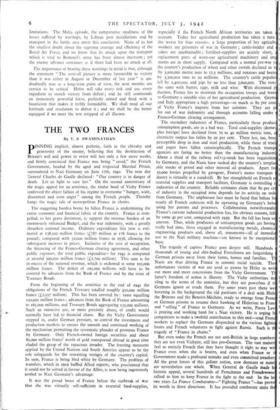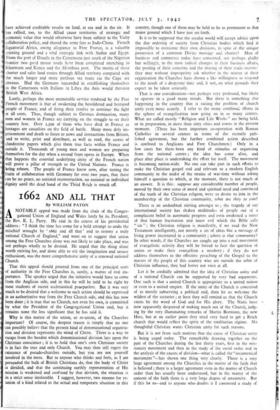THE TWO FRANCES
By V. S SWAM INATHAN
pINNING implicit, almost pathetic, faith in the chivalry and generosity of the enemy, believing that the destruction of Britain's will and power to resist will last only a few more weeks, and firmly convinced that France was being "saved," the French Government, headed by the aged and respected Marshal Petain, surrendered to Nazi Germany on June 17th, 1940. The next day General Charles de Gaulle declared : "Our country is in danger of death. Let us fight to save her." On the second anniversary of the tragic appeal for an armistice, the titular head of Vichy France confessed the abject failure of his regime to overcome "hunger, want, discontent and even anger" among the French people. Thereby hangs the tragic tale of metropolitan France in chains.
The staggering burden borne by fallen France is undermining the entire economic and financial fabric of the country. France is com- pelled, to her grave detriment, to support the onerous burden of an enormously enhanced Budget, and the war indemnity, with a greatly shrunken national income. Ordinary expenditure this year is esti- mated at 138,500 million francs (£787 million at 176 francs to the pound), compared with 52,000 million francs in 1938, allowing for subsequent increase in prices. Inclusive of the cost of occupation, the financing of the Franco-German clearing agreement, and other public expenses, the total public expenditure for 1942 is computed at around 300,000 million francs (£i,7oo million). This sum is far in excess of the national revenue, which is reckoned at some 105,000 million francs. The deficit of 195,000 millions will have to be covered by advances from the Bank of France and by the issue of Treasury Bonds.
From the beginning of the armistice to the end of 1941 the obligations of the French Treasury totalled roughly 450,000 million francs (£2,557 million). This has been covered by: taxes equalling 550,000 million francs ; advances from the Bank of France amounting to 165,000 millions, and Treasury Bonds aggregating 535,000 millions.
Such an extensive use, or more precisely abuse, of credit would normally have led to financial chaos. But the Vichy Government stepped in, under German pressure, to- control the investment and production markets to ensure the smooth and continued working of the mechanism permitting the systematic plunder of prostrate France • by Germany. Only French-owned foreign securities and about 85,000 million francs' worth of gold transported abroad in good time eluded the grasp of the rapacious invader. The freezing measures applied by the United Nations and South America appear to be the sole safeguards for the remaining vestiges of the country's capital. In sum, France is being bled white by Germany. The problem of transfers, which in 1919 baffled Allied experts, who proclaimed that it could not be solved in favour of the Allies, is now being ingeniously settled to Nazi Germany's advantage.
It was the proud boast of France before the outbreak of war that she was virtually self-sufficient in essential food-supplies,
especially if the French North African territories are taken account. Today her agricultural production has taken a turn the worse for four reasons: a large proportion of her agricul workers are prisoners of war in Germany ; cattle-fodder and cakes are unobtainable ; fertiliser-supplies are acutely short, teplacement parts of worn-out agricultural machinery and im ments are in short supply.. Compared with a normal pre-war y the country's production of wheat and other cereals declined in by 3,500,00o metric tons to 12.5 millions, and notatoes and beetr by 3,3oo,000 tons to 20 millions. The country's cattle popular fell by 1,400,000, and pigs by no less than 3,600,000. The sto the same with butter, eggs, milk and wine. With decreased p duction, France has to maintain the occupation troops and tran to Germany a sizeable slice of her agricultural production. Germ and Italy appropriate a high percentage—as much as 80 per cen of Vichy France's imports from her colonies. They are p for out of war indemnity and through accounts falling under Franco-German clearing arrangement.
The secondary industries of France, particularly those produc consumption goods, are in a bad way. Total coal-supplies (dom plus foreign) have declined from 70 to 40 million metric tons, electricity output has fallen by 20 per cent. There has, too, be perceptible drop in iron and steel production, while those of text' and paper have fallen catastrophically. The French trans agencies are faring no better than the manufacturing industri About a third of the railway rol::ag-stock has been requisitio by Germany, and the Nazis have sucked dry the country's irrepla able stocks of petrol and other mineral oil products. Apart fr 50,000 lorries propelled by gasogene, France's motor transport dustry is virtually at a standstill. By her stranglehold on French material supplies and transport facilities, Germany is controlling t industries of the country. Reliable estimates claim that 8o per cc of industry in the occupied zone depends for its activity on ord from Germany. The unpleasant fact must be faced that before lo nearly all French concerns will be operating on Germany's beh using her patents and processes. Collaboration notwithstand. France's current industrial production has, for obvious reasons, fall by some 40 per cent, compared with 1939. But thelall has been v uneven. Thus, while producers of consumption goods are having really bad time, those engaged in manufacturing metals, chemica engineering products and, above all, armaments—all of immed use to the Nazi military machine—are known to be exceptiona busy.
The tragedy of captive France goes deeper still. Hundreds thousands of young and able-bodied Frenchmen are languishing German prisons away from their farms, homes and families. Nazis are thus driving France to commit racial suicide. The unfortunate victims of war are used as pawns by Hitler to wn out more and more concessions from the Vichy Government. latter's freedom of action is illusory. The Vichy authorities m cling to the terms of the armistice, but they are powerless if Germans ignore or evade them. For some years past there we hovering in the background the old partisans of a deal with Hid the Brinons and the Benoist-Mechins, ready to emerge from Fren or German prisons to resume their hawking of Hiderism to Fran and " selling " of France to Germany. As we write, Pierre Lay is praying and working hard for a Nazi victory. He is urging compatriots to make a twofold contribution to this aid—send Fren workers to replace the Germans dispatched to the various figh fronts and French volunteers to fight against Russia. Such is tragedy of "France in chains."
But even today the French are not anti-British in large numbe they are not even Vichyist, still less pro-German. The vast majori feel so entirely French that they have thought it right to stay w France even when she is beaten, and even when France or Government made a profound mistake and even committed .treach All the great forces of this gallant nation, now dormant or num are nevertheless one whole. When General de Gaulle Made historic appeal, several hundreds of Frenchmen and French rallied to him to keep France in the fight to the end. In the la two years La France Combancane—" Fighting France "—has prov its worth in three directions. It has provided combatant units
have achieved creditable results on land, at sea and in the air. It has rallied, too, to the Allied cause territories of strategic and economic value that would otherwise have been subject to the Vichy collaboration policy, and shared the same fate as Indo-China. French Equatorial Africa, owing allegiance to Free France, is a valuable training ground and a vital strategic link with Sudan and Egypt. From the port of Douala in the Cameroons just south of the Nigerian frontier two gocd motor roads hove been completed stretching to Khartoum and Kenya and the Mombasa port. The merits of these shorter and safer land routes through Allied territory compared with the much longer and more perilous sea route via the Cape are obvious. Had the Germans succeeded in establishing themselves in the Cameroons with Italians in Libya the Axis would threaten British West Africa.
Lastly, perhaps the most memorable service rendered by the Free French movement is that of awakening the bewildered and betrayed people of France, and of firing their resolve to continue the fight at all costs. Thus, though subject to German domination, many men and women in France are carrying on the struggle to set their country free. Over 1,5oo of them who have died in France as hostages are casualties on the field of battle. Many more defy im- prisonment and death to listen to news and instructions from Britain, and to write, print and distribute, as well as read, the scores of clandestine papers which give them true facts within France and outside it. Thousands of young men and women are preparing themselves for the day when a second front opens in Europe. When that happens the essential underlying unity of the French nation will prove a pillar of strength to the United Nations. France is being reborn. The people of France know now, after tasting the fruits of collaboration with Germany for over two years, that there can be no peace, no national reconstruction, no national or individual dignity until the dead hand of the Third Reich is struck off.



























 Previous page
Previous page